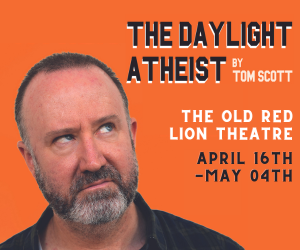Freefall is a stylish, sophisticated drama about the prejudice of loss. The fragments of a man's life ,after a stroke and before his final moments, ebb and flow on a relentless tide of dispassion. It is a sad portrait of a brittle man who funnels his identity through his hankering after his long gone sister, whom he was traumatically separated from as a child. As a result he is dominated by others and is ultimately unknowable, by himself, and those closest to him. In the opening, the man, John (Andrew Bennet) is asked a question in a video interview by his unseen son Tell me something about yourself asks Jack. You know everything about me replies his father, says Jack No I don't .The experience of the play is like a stream of consciousness as scenes overlap, boundaries disappear and characters appear, disappear and transform from say, his wife, to his mother with a slight light change. The order is back and forth from present, when he has his stroke, to when he was a child and steps in bizarre sequence, through the growing void of his marriage. There is nothing confusing about how this is presented, director Annie Ryan and the collaborating actors have created an exquisitely calibrated mixture of flowing emotional hacking and passivity that pulses in and out like a heartbeat. You get a real sense of John's life in a completely linear manner even if the sequences are wildly displaced.The style is ferociously inventive; mixture of radio play (with great sound effects by the actors), documentary film (superb work by Jack Phelan, Kris Stone) and drama with Corn Exchange's own brand of the surreal aesthetic. For instance, the doctor examines him like a car, with sound effects of a pneumatic drill, satirising the modern sixty-second diagnosis. When John burns dinner, Tayto packs are tossed on to the table from off stage, even though he is on stage. These are fun diversions, and well needed, for the underlying dark themes that bite into you. The sophistication of the relationships, between his wife (Janet Moran) and his relentlessly bullying cousin (Louis Lovett) is a remarkable accomplishment by the actors. Mr. Bennett never gives into a pathetic rendition but plays this troubled, lost man with heartfelt sincerity. His wife who calls herself 'cold' and 'hard' is wonderfully detailed by Ms. Moran who comes over as sympathetic, even in her deceit. The flaw in the work is that John is a victim, and victims are difficult characters for drama to reach the required heights. it is not John who receives any realisation but his cousin's ditzy girlfriend (affecting, honest portrayal by Ruth Gill). As a mirror of John, she realises that she must leave Denis because she loves him and he will never return that kind of love. The dry-rot man (Damian Kearney), another eloquent symbol for the stasis that John has created in his life with devastating effect, makes it very clear what is wrong. John tells his wife about the dry-rot ;We've a very serious problem, it's been there for years and we haven't done anything about it. John's lack of any realization may be the point but it makes the work somewhat bloodless.John was warned by a kindly priest (completely owned by Mr. Kearney) in his early years who told him he could have a different life than the other 'savages' not despite, but because of his adversity. He fails to take this advice on and this is the error of his life. Near the close of his life, he admits to 'numbness'. As he says to his doctor I feel powerless, unable to respond to my appetites and desires. How diminished I am . The flotsam of numbness, the jetsam of powerlessness that he carries himself along on through life to his destiny renders this play ultimately into a searing and terrifying anthem to man's disarray in the final moments.









